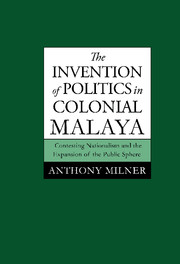 The Invention of Politics in Colonial Malaya
The Invention of Politics in Colonial Malaya Book contents
- Frontmatter
- Contents
- Preface
- Map of Malaya
- Introduction: Colonialism, Nationalism and Contest
- 1 The Ancien Régime: Described and Condemned
- 2 Establishing a Liberal Critique
- 3 A Description of the Real World: Expanding Vocabularies
- 4 Conceptualizing a Bangsa Community: A Newspaper of Moderate Opinions
- 5 Building a Bourgeois Public Sphere
- 6 Ideological Challenge on a Second Front: The Kerajaan in Contest with Islam
- 7 Answering Liberalism: Islamic First Moves
- 8 Kerajaan Self-reform: Chronicling a New Sultanate
- 9 Practising Politics in the Mid-Colonial Period
- 10 Surveying the Homeland: Sedar and Dialogic Processes
- Conclusion: The Malay Political Heritage
- Select Bibliography
- Index
7 - Answering Liberalism: Islamic First Moves
Published online by Cambridge University Press: 18 December 2009
- Frontmatter
- Contents
- Preface
- Map of Malaya
- Introduction: Colonialism, Nationalism and Contest
- 1 The Ancien Régime: Described and Condemned
- 2 Establishing a Liberal Critique
- 3 A Description of the Real World: Expanding Vocabularies
- 4 Conceptualizing a Bangsa Community: A Newspaper of Moderate Opinions
- 5 Building a Bourgeois Public Sphere
- 6 Ideological Challenge on a Second Front: The Kerajaan in Contest with Islam
- 7 Answering Liberalism: Islamic First Moves
- 8 Kerajaan Self-reform: Chronicling a New Sultanate
- 9 Practising Politics in the Mid-Colonial Period
- 10 Surveying the Homeland: Sedar and Dialogic Processes
- Conclusion: The Malay Political Heritage
- Select Bibliography
- Index
Summary
In developing an Islamic answer to liberalism the shari'ah-minded writers of Al Imam drew upon the new philosophy itself. They drew, in particular, from the language or, more precisely, the discourse encountered in such writings as the Utusan. Even when Al Imam delivers what appears to be an effective rebuttal of liberal claims – and it is certainly capable of rising to the ideological occasion – it enters debate, perhaps unwittingly, in such a way as to promote new, and not markedly Islamic, ways of thinking about society. It partakes, in fact, in the constituting of what was to become the discourse of politics. To understand the dyamics which led to these ideological shifts on the part of Al Imam, it is necessary, first, to take note of the ideological distance between the Islamic journalists and such writers as Eunos. This distance is seldom evident in historical studies of the period. The fact that such studies usually give priority to the development of nationalism tends to influence the way they perceive Al Imam.
One article, for instance, calls the journal “a first step in the Malay nationalist movement in Malaya”. William Roff, although acknowledging Al Imam's religious orientation, assesses the journal primarily in the context of his investigation into the origins of Malay nationalism. He deliberately teases out its specifically social and political concerns. Although noting that the journal does not express “an explicit form of political nationalism” he chooses to emphasize Al Imam's concern with the “state of Malay society”.
- Type
- Chapter
- Information
- The Invention of Politics in Colonial MalayaContesting Nationalism and the Expansion of the Public Sphere, pp. 167 - 192Publisher: Cambridge University PressPrint publication year: 1995


